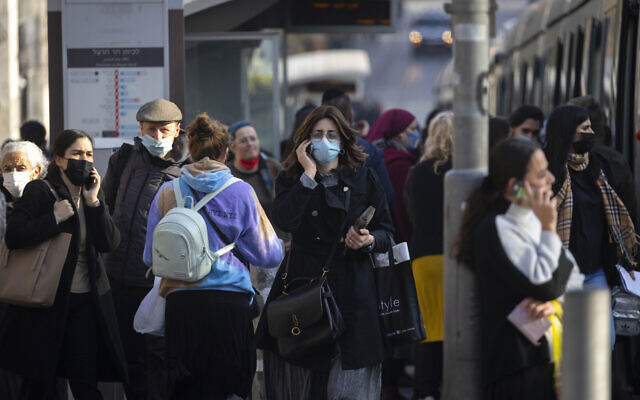A top Health Ministry official on Monday said Israel has “no control” over the Omicron-fueled coronavirus outbreak sweeping the country, as infections continued to surge.
“We are trying as much as possible to reduce infections and lessen the force of this wave, but it will be a high wave,” Dr. Sharon Alroy-Preis, head of public health services at the Health Ministry, told Channel 13 news.
Alroy-Preis said the ministry was focused on preventing serious COVID-19 cases, not only on curbing infection rates.
She denied reports saying health officials were pivoting to a policy of allowing Omicron to spread in hopes that the more contagious, yet less virulent strain of coronavirus, would quickly burn through the population and lead to herd immunity.
“We don’t know if there’ll be a wave that will wash over [us all] and all will be good afterward, and then there’ll be some kind of immunity,” she said.
Pressed on this point, Alroy-Preis noted the virus has continued to mutate since first emerging in China in late 2019.
“We see that Omicron infects people who are recovering [from previous variants],” she said. “How can I be sure that the next variant won’t infect people who caught Omicron? I can’t give weight to these predictions [of herd immunity].”
She said she was unsure about widely publicized predictions in recent days that millions of Israelis will contract Omicron.
Health workers perform antigen rapid tests on Israelis at a Magen David Adom testing center in Jerusalem, January 3, 2022. (Olivier Fitoussi/Flash90)
Alroy-Preis also expressed concerns about the potential for serious infections, despite growing signs that Omicron causes less severe disease than other COVID-19 strains, noting older Israelis could be at greater risk than their European counterparts who more recently received booster shots.
“We have an at-risk population here that got a booster five-six months ago, and therefore we are checking the figures in Israel,” she said.
“We don’t have a red line for going to a lockdown but it’s enough to look where we were in previous waves and understand how taut the [healthcare] system was with 1,200 serious patients,” she added, referring to morbidity figures recorded last January during Israel’s worst COVID-19 outbreak.
Meanwhile, Channel 13 again quoted unnamed senior officials at the Health Ministry saying millions will get Omicron. The officials also said restrictions would not help in dealing with the outbreak.
Earlier Monday, Israel’s coronavirus czar Salman Zarka similarly said anything short of far-reaching measures would be ineffective in bringing down cases.
“In the situation we are in, light restrictions won’t help. We can go toward very significant restrictions like the first lockdown, because other restrictions won’t bring down infections. So we’re not recommending restrictions at this time just for the sake of saying we asked for them,” Zarka said during a press briefing.
He also rejected speculation the government was aiming for a policy of herd immunity, saying hopes that Omicron could quickly spread unchecked through the population without overwhelming the hospital system were scientifically invalid.

People, many wearing face masks, walk on Jaffa Street in Jerusalem January 2, 2022. (Olivier Fitoussi/Flash90)
Meanwhile, updated Health Ministry statistics released Monday evening showed 7,569 new infections were confirmed since midnight, surpassing the 6,576 cases recorded during all of Sunday.
Active cases further rose to 42,364, including 210 people hospitalized for COVID-19 complications. Of those, 108 were in serious condition.
The positive test rate also continued to climb, with nearly 5.6 percent of the over 225,000 tests performed Monday coming back positive.
The national death toll stood at 8,247.
According to the Health Ministry, 6,583,772 people have received at least one vaccine dose, 5,933,665 have gotten two shots and 4,271,390 have received a third dose, out of a population of around 9.3 million.
The ministry has not yet released official figures on how many Israelis have received a fourth shot, which on Monday became available to anyone over 60 and medical workers. The extra booster shots had previously been limited to the immunocompromised.
Prime Minister Naftali Bennett released a statement Monday saying over 100,000 Israelis received a fourth vaccine dose or scheduled an appointment to receive one, but did not provide a further breakdown.